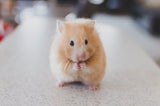Veterinarian Column: Preparing to welcome an exotic animal



Before welcoming an exotic animal, prepare the necessary items in advance. We will explain about rabbits, ferrets, and hamsters. ( * is common)
preparation list
◎ Tableware, water dispenser
Rabbit : Prepare a rabbit food container and pasture container. We recommend a fixed type that does not flip over. A bottle-type water dispenser will prevent the inside of the cage from getting wet. If you cannot drink from a water bottle, prepare a fixed plate.
Ferrets : Prepare a heavy food container that is difficult to tip over. A water bottle is recommended as a water dispenser.
Hamster : Prepare a plate for food. You can also use small plates sold at 100 yen stores. If you use a bottle type water dispenser, be sure to bleed the air out every time to prevent problems such as water leakage or no water coming out due to air clogging.
◎ Food
Rabbit : Prepare pellets and hay. Be sure to feed your dog plenty of grass to prevent dental and gastrointestinal problems.
Ferrets : Prepare pellets for ferrets. Low carbohydrate content is preferred. Ferrets are carnivores, so avoid feeding them fruits.
Hamster : Prepare pellets for your hamster. Avoid mixed foods that contain things like sunflower seeds, as they can make your dog picky. In addition, bird feed (millet, millet, millet, etc.) and vegetables (please note that there are some foods that cannot be fed) are also provided.
◎ Gauge
Rabbits : We recommend a cage with a pull-out wire floor. Place a toilet sheet or newspaper under the cage. Easy to clean daily and hygienic. Prepare a fixed toilet.
Ferrets : Cages sold for ferrets are safe. Prepare ferret bedding, towels, and cloth for the hammock, toilet, and bedding area.
Hamsters : Cages sold for hamsters are easy to use. Prepare a birdhouse, toilet, and wheel. You may use flooring, but be sure to change it frequently to keep it clean. We recommend laying down newspaper or kitchen paper and cleaning it every day. You can check the amount of stool and the color of urine at a glance, making it easy and economical to manage your health.
* It is useful to have a disinfectant and deodorizer spray when cleaning cages and toilets.
◎ Carry bag
* Required for commuting to the hospital or during a disaster. Choose something you can't escape from.
◎ Care goods ( grooming brush , nail clippers)
* If you find it difficult to trim your dog's nails, please ask at a veterinary hospital shop.
Rabbits : Get your rabbit used to brushing and brush it regularly to prevent hairballs and skin diseases.
◎ Preparing the environment
* Be careful of temperature control to avoid getting too hot or too cold.
Rabbits : Cover electrical cords to prevent them from being chewed on. Get rid of any items that are dangerous for your rabbit to chew on.
Ferrets : They are curious animals, so take them out of their cage every day and give them some exercise. Be careful not to accidentally bite into mattresses such as sofas or rubber items.
◎ Things to know before you start keeping a pet
* Know the habits of the animal you want to keep (nocturnal, likes and dislikes of communication, etc.) and consider whether it fits your lifestyle.
* Understand the animal's lifespan (diseases it is susceptible to) and lifetime costs, and make a decision based on your own health and financial aspects.
* Look for a hospital that can treat exotic animals in advance. Recommended hospitals that provide thorough guidance on breeding and hospitals that specialize in exotic animals are reliable.
When you adopt a pet, you are welcoming a family member. Can you take responsibility and take care of them until the end? Take time to talk carefully with your family and prepare to welcome them.
References Rabbit/Ferret Rodent Internal Medicine and Surgery










